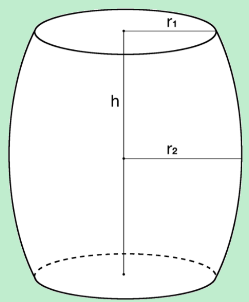Barrel Volume Calculator - Calculate volume in litres, gallons, cubic feet, bbl, cubic meters

How To Calculate a Barrel
Volume Calculation
The volume of a barrel can be determined using one of the following formulas:
\[ \text{Volume} = \frac{h \times \pi \times \left(1.25 \times r_2^2 + r_1^2\right)}{3} \]
or
\[ \text{Volume} = \frac{h \times \pi \times \left(2 \times r_2^2 + r_1^2\right)}{3} \]
Where:
- h = Height of the barrel
- r1 = Radius at the top or bottom
- r2 = Radius at the widest part (middle)
- The difference between these formulas lies in how much emphasis is placed on the middle radius
r2, with the second formula assigning a larger weight to it.
- What is the significance of using different weights for
r2in the formulas?
Using different weights forr2adjusts the calculation to account for barrels with varying shapes. A larger weight forr2assumes the middle section has more influence on the overall volume, often appropriate for barrels with more pronounced bulges. - How do you measure the radii
r1andr2accurately for irregularly shaped barrels?
To measurer1andr2, use a measuring tape or calipers. Measure the diameter at the top, bottom, and widest part, then divide each by 2 to get the respective radii. For irregular shapes, take multiple measurements and use the average. - Can these formulas be applied to barrels with non-symmetrical shapes?
These formulas assume symmetrical barrels. For non-symmetrical shapes, divide the barrel into smaller segments that approximate simpler shapes, calculate their volumes individually, and sum them. - What are the practical applications of these formulas?
These formulas are used in industries like winemaking, brewing, and oil storage to estimate the capacity of barrels. The choice between formulas depends on the specific barrel shape and precision requirements. - How does the volume calculation change if the barrel is tilted instead of upright?
If the barrel is tilted, the effective height changes depending on the angle of tilt. This requires trigonometric adjustments to the height parameterhin the formula. Additionally, the shape of the liquid surface must be accounted for if the barrel is partially filled.
Diameter of 50Gallon Barrel
| Type | Tight-Head | Open-Head | Tight-Head | Open-Head | Tight-Head | Open-Head |
|---|---|---|---|---|---|---|
| Material | STEEL | STEEL | PLASTIC | PLASTIC | FIBER | FIBER |
| Outside Height | 33” | 34-3/4” | 34-3/4” | 36-3/4” | - | 35-1/2” |
| Outside Diameter | 23” | 24-1/2” | 23-1/4” | 22-7/8” | - | 22-3/8” |
| These are all approximate dimensions. They’ll vary slightly from manufacturer to manufacturer, and from style to style. | ||||||
 Home
Home Back
Back